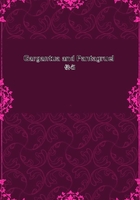
第105章
How Pantagruel found Panurge, whom he loved all his lifetime.
One day, as Pantagruel was taking a walk without the city, towards St.
Anthony's abbey, discoursing and philosophating with his own servants and some other scholars, (he) met with a young man of very comely stature and surpassing handsome in all the lineaments of his body, but in several parts thereof most pitifully wounded; in such bad equipage in matter of his apparel, which was but tatters and rags, and every way so far out of order that he seemed to have been a-fighting with mastiff-dogs, from whose fury he had made an escape; or to say better, he looked, in the condition wherein he then was, like an apple-gatherer of the country of Perche.
As far off as Pantagruel saw him, he said to those that stood by, Do you see that man there, who is a-coming hither upon the road from Charenton bridge? By my faith, he is only poor in fortune; for I may assure you that by his physiognomy it appeareth that nature hath extracted him from some rich and noble race, and that too much curiosity hath thrown him upon adventures which possibly have reduced him to this indigence, want, and penury. Now as he was just amongst them, Pantagruel said unto him, Let me entreat you, friend, that you may be pleased to stop here a little and answer me to that which I shall ask you, and I am confident you will not think your time ill bestowed; for I have an extreme desire, according to my ability, to give you some supply in this distress wherein I see you are;because I do very much commiserate your case, which truly moves me to great pity. Therefore, my friend, tell me who you are; whence you come; whither you go; what by desire; and what your name is. The companion answered him in the German (The first edition reads "Dutch.") tongue, thus:
'Junker, Gott geb euch gluck und heil. Furwahr, lieber Junker, ich lasz euch wissen, das da ihr mich von fragt, ist ein arm und erbarmlich Ding, und wer viel darvon zu sagen, welches euch verdrussig zu horen, und mir zu erzelen wer, wiewol die Poeten und Oratorn vorzeiten haben gesagt in ihren Spruchen und Sentenzen, dasz die gedechtniss des Elends und Armuth vorlangst erlitten ist eine grosse Lust.' My friend, said Pantagruel, Ihave no skill in that gibberish of yours; therefore, if you would have us to understand you, speak to us in some other language. Then did the droll answer him thus:
'Albarildim gotfano dechmin brin alabo dordio falbroth ringuam albaras.
Nin portzadikin almucatin milko prin alelmin en thoth dalheben ensouim;kuthim al dum alkatim nim broth dechoth porth min michais im endoth, pruch dalmaisoulum hol moth danfrihim lupaldas in voldemoth. Nin hur diavosth mnarbotim dalgousch palfrapin duch im scoth pruch galeth dal chinon, min foulchrich al conin brutathen doth dal prin.' Do you understand none of this? said Pantagruel to the company. I believe, said Epistemon, that this is the language of the Antipodes, and such a hard one that the devil himself knows not what to make of it. Then said Pantagruel, Gossip, I know not if the walls do comprehend the meaning of your words, but none of us here doth so much as understand one syllable of them. Then said my blade again:
'Signor mio, voi vedete per essempio, che la cornamusa non suona mai, s'ella non ha il ventre pieno. Cosi io parimente non vi saprei contare le mie fortune, se prima il tribulato ventre non ha la solita refettione. Al quale e adviso che le mani et li denti habbiano perso il loro ordine naturale et del tutto annichilati.' To which Epistemon answered, As much of the one as of the other, and nothing of either. Then said Panurge:
'Lord, if you be so virtuous of intelligence as you be naturally relieved to the body, you should have pity of me. For nature hath made us equal, but fortune hath some exalted and others deprived; nevertheless is virtue often deprived and the virtuous men despised; for before the last end none is good.' (The following is the passage as it stands in the first edition.
Urquhart seems to have rendered Rabelais' indifferent English into worse Scotch, and this, with probably the use of contractions in his MS., or 'the oddness' of handwriting which he owns to in his Logopandecteision (p.419, Mait. Club. Edit.), has led to a chaotic jumble, which it is nearly impossible to reduce to order.--Instead of any attempt to do so, it is here given verbatim: 'Lard gestholb besua virtuisbe intelligence: ass yi body scalbisbe natural reloth cholb suld osme pety have; for natur hass visse equaly maide bot fortune sum exaiti hesse andoyis deprevit: non yeless iviss mou virtiuss deprevit, and virtuiss men decreviss for anen ye ladeniss non quid.' Here is a morsel for critical ingenuity to fix its teeth in.--M.) Yet less, said Pantagruel. Then said my jolly Panurge:
'Jona andie guaussa goussy etan beharda er remedio beharde versela ysser landa. Anbat es otoy y es nausu ey nessassust gourray proposian ordine den. Non yssena bayta facheria egabe gen herassy badia sadassu noura assia. Aran hondavan gualde cydassu naydassuna. Estou oussyc eg vinan soury hien er darstura eguy harm. Genicoa plasar vadu.' Are you there, said Eudemon, Genicoa? To this said Carpalim, St. Trinian's rammer unstitch your bum, for I had almost understood it. Then answered Panurge: